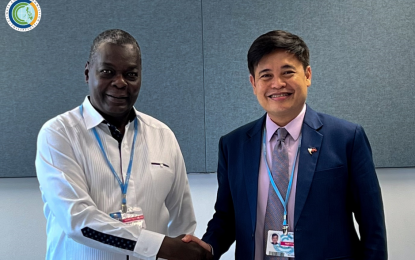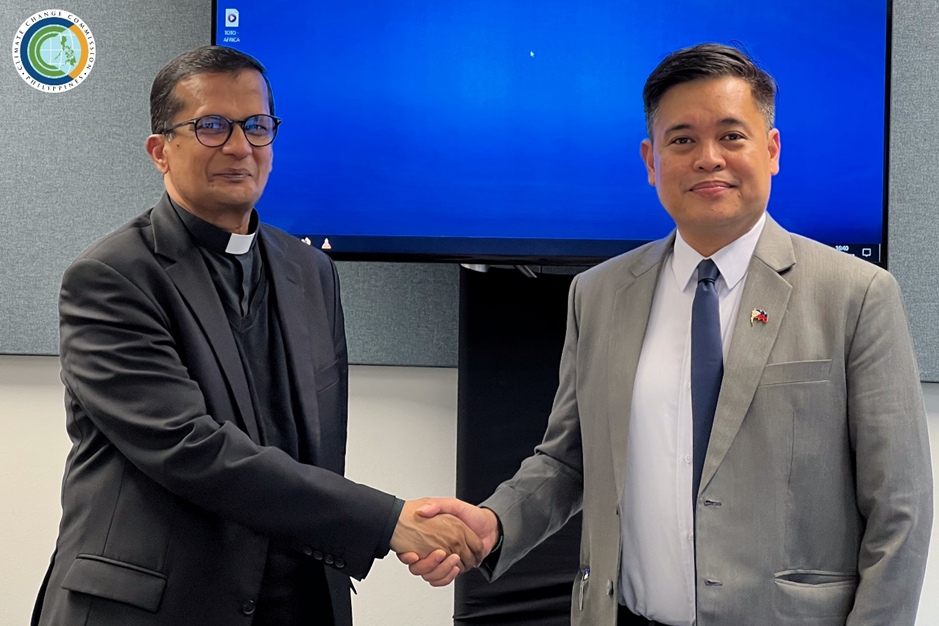
CLIMATE ACTION PARTNERS. Climate Change Commission Secretary Robert E.A. Borje (right) and Group of 77 Chair Ambassador Pedro L. Pedroso Cuesta of Cuba meet on the sidelines of the 58th Session of the Subsidiary Bodies (SB58) of the United Nations Framework Convention on Climate Change (UNFCCC) held in Bonn, Germany on June 6-18, 2023. Borje and Cuesta committed to advancing the positions of developing nations in all UNFCCC meetings. (Photo courtesy of CCC)
BONN, Germany – The Philippines and the Group of 77 (G77) through its chair Cuba have committed to work closely and further reinforce coordination to advance the positions of developing nations in all relevant meetings of the United Nations Framework Convention on Climate Change (UNFCCC).
Meeting on the sidelines of the recent 58th Session of the Subsidiary Bodies (SB58) of UNFCCC here, Climate Change Commission (CCC) Secretary Robert E.A. Borje and Group of 77 Chair Ambassador Pedro L. Pedroso Cuesta emphasized the need to align climate action agenda towards result-oriented SB and Conference of the Parties (COP).
Borje and Cuesta renewed the commitment of both delegations to work closely together and further reinforce coordination in the lead-up to the 28th COP28 to the UNFCCC in the United Arab Emirates in November 2023.
They said COP28 is a valuable opportunity to build on the gains of G77 and COP27 in Sharm-El-Sheikh in Egypt on Nov. 6-18, 2022.
Both officials discussed the need to further strengthen the positions of developing nations in loss and damage as well as in scaling and speeding up the delivery of commitments of industrialized nations to developing nations in terms of capacity building, technology development and transfer, as well as climate finance.
“Developing nations need to work even more closely under the ambit of the G77 to better articulate principled positions on climate change and make even more resonant our message on living up to commitments under the UNFCCC and the Paris Agreement,” Borje, head of the Philippine delegation, said.
“The Philippines appreciates the work of Cuba as Chair of G77 and we will ensure we are a constructive partner to the Chair and to the G77 in advancing our shared objectives,” he added.
Cuesta is also head of the Cuba delegation to SB58 held from June 5 to 15 in Bonn, Germany.
Ecosystem stewards
Borje and Monsignor John Kallarackal, head of delegation of the Holy See, also met on the sidelines of the SB58, underscoring the importance of cooperation in ramping education programs on both climate change and of human stewardship to better protect and manage ecosystems and natural resources.
They also agreed to explore ways by which stewardship could be pushed in appropriate fora within and outside the United Nations system.
“Education plays a crucial role in addressing climate change. We need to empower our youth and adults through education on intergenerational responsibility in order to change what is now a story of devastation into a story of transformation. We need to start them young,” Borje said.

Kallarackal, for his part, said promoting education was one of the efforts of the Holy See at the 27th COP27.
“The Holy See recognizes the importance of education in the fight against climate change, thus, promoted education, lifestyle and behavioral change, as well as lobbied for net-zero, in COP27,” he said.
They agreed that loss and damage funding (LDF) is vital to helping vulnerable countries to climate change, such as the Philippines, to recover quickly.
Borje emphasized that “expeditious, stable and predictable disbursement of LDF is key to helping developing countries to recover from the loss and damage resulting from the impacts of climate change.”
Both Borje and Kallarackal also recalled with great reflection Typhoon Yolanda and its impacts on the Philippines, underscoring the need to learn from lessons and continuing education to further increase awareness and capacities to address and respond to such severe extreme climate events.
Borje and UNFCCC Executive Secretary Simon Stiell also emphasized the need to continue working together “in a constructive manner” to ensure that the SB58 meetings and the COP28 would deliver outcomes and results, particularly for vulnerable developing nations.
Borje acknowledged the work of the UNFCCC Secretariat in providing a platform defined by “an enabling environment for discussion and cooperation,” with an emphasis on universal participation and inclusivity.
“The Philippines appreciates the work of the UNFCCC Secretariat and will continue to support all efforts that ensure that all relevant UNFCCC meetings are supported accordingly, both in terms of substance and operations,” Borje said.
Stiell, on the other hand, reassured that the UNFCCC Secretariat remained fully committed to the UNFCCC processes and was at the full disposal of Parties.
Both officials looked forward to continue coordinating in the leadup to COP28 in Dubai, United Arab Emirates towards success, and support all efforts for meaningful and transformative outcomes of UNFCCC meetings. (PNA)
